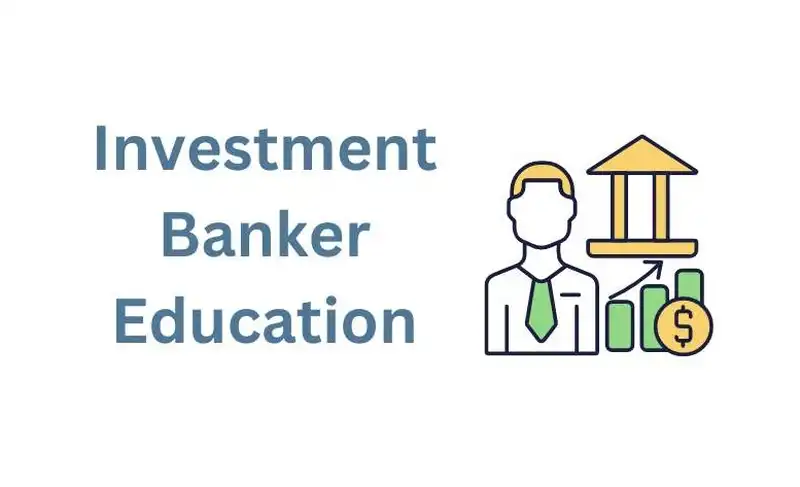As an investment banker, you face constant pressure to achieve success. To be successful in this demanding and competitive industry, you must have the right education. This guide will outline the education requirements for a successful investment banking career and provide tips on securing an education in this field.
Additionally, we’ll discuss the benefits and disadvantages of having a degree in investment banking, along with five tips for ensuring your success after completing your education. If you’re interested in becoming a successful professional in the world of finance, then read on!
What is an investment banker?

An investment banker is a professional who helps companies raise money by issuing and selling securities. Investment bankers work in different areas, such as corporate finance, public relations, and investment banking.
The investment banker’s career typically lasts between 5 and 10 years. An investment banker’s success depends on their ability to identify new opportunities, assess risks, create relationships with key stakeholders, negotiate deals, and provide top-level advice to clients.
Becoming an investment banker starts with gaining the right education. Many schools offer degrees in business administration (BBA), accounting, or economics that prepare students for careers in finance.
Courses in financial analysis, portfolio management, risk assessment, and financial engineering are also important for becoming an effective financier. After completing undergraduate studies at a school of your choice, you will need to obtain a FINRA Series 7 license allowing you to work as a registered representative/broker-dealer.
Finally, you must pass the CFA exam to pursue membership in the prestigious Financial Analyst Institute (FAI). The FAI offers two levels of certification: Level I provides generalizable knowledge about investing.
At the same time, Level II prepares candidates for Chartered Financial Analyst (CFA) exams, which focus more specifically on numerical techniques used throughout asset management. There are currently over 120 thousand members of the FAI worldwide!
The demanding and competitive landscape of the investment banking industry
A successful investment banker requires a strong academic background in business, economics, mathematics, and statistics. Prior experience working in the financial services industry is also beneficial. Many firms prefer to recruit from within their own company or network of companies.
The high standards and intense competition found in the investment banking industry mean that bankers must be able to handle a lot at once: they need to have superb analytical skills; excellent problem-solving abilities; strong leadership and communication abilities; good teamwork skills; as well as an understanding of complex financial models.
Furthermore, bankers are expected to maintain extremely high work-life balance management expectations – often putting long hours into their professional careers while maintaining personal responsibilities such as caring for children or spouses.
Despite these challenges, becoming a successful investment banker is possible if you have the correct qualifications and dedicate yourself fully to your career goals. You can achieve anything you want with hard work and dedication!
Education requirements for a successful career in investment banking
To become a successful investment banker, you will need to have a high level of education. A degree in finance, business administration, or economics is usually required for entry-level positions. After that, experience and training will help you gain the skills and knowledge necessary to be successful in the field.
Achieving success as an investment banker begins with having the right foundation. Years of hands-on experience are essential for thinking strategically and solving complex problems. In addition, your career as an investment banker will require strong theoretical knowledge of financial accounting principles and analysis techniques, risk management principles, corporate finance theories (including mergers & acquisitions), securities laws (such as SEC Rule 10b5-1), and market analysis tools (such as Bloomberg).
Finally, practical skills such as Strong oral/written communication abilities, effective negotiation, and problem-solving abilities
are also important for success in this industry. Because careers within investment banking can vary widely depending on company size, location, sector specialization, etc., it’s important to tailor your education accordingly.
Fortunately, many online schools offer flexible coursework options that fit nearly any budget. So if you want a career in one of today’s most exciting industries – learn about it from the best!
How to secure an education in investment banking
Investment banking is a highly competitive career field. To secure an education in this field, you must be extremely dedicated and work hard.
There are many investment banking schools that you can choose from, but the education in investment banking is extremely competitive. The competition for admission into these programs is so high that only the best students will be able to get accepted. In addition, many banks prefer hiring graduates from their schools rather than accepting those attending other institutions. Therefore, you must thoroughly research which program best meets your needs and qualifications before committing to anything.
Once you decide which program to attend, start planning your educational journey by registering for classes as soon as possible! Before beginning your training, you will need at least two years of full-time study (or equivalent).
Tips for success after completing your education in investment banking
After completing your education in investment banking, you will be ready to start your career. However, success doesn’t come overnight, and there are a few key things you need to do to succeed.
- Make sure you take the time to reflect upon what you want to do with your life after completing your degree in finance. This might involve developing a personal long-term plan or identifying specific goals for yourself over the next several years. Once you have a good idea of what you want, it’s important to begin implementing steps toward fulfilling this goal.
- Building strong relationships while still at school or after graduation is also important. Attending networking events and educational seminars can help increase your network of contacts and provide valuable opportunities for professional development. You should aim during and after college by taking advantage of all available resources!
- Remember to learn! Your education in investment banking will equip you with a skill set that makes becoming a successful professional very achievable, but continual learning will ensure that those skills stay sharpened.
- Finally, make sure that money is only part of it when starting in finance – focus on developing other qualities such as interpersonal skills, problem-solving abilities, resilience under pressure, etcetera which is just as vital for any successful career path.
- Keep pushing forward no matter how tough times may seem; if anything, they will only serve as an opportunity for growth.
Benefits of Investment Banker Education
Investment banker education can give you a competitive edge when seeking employment. Here are five of the most salient benefits:
- Investment banker education provides valuable skills in high demand in today’s economy. Many employers are looking for candidates with strong analytical and problem-solving abilities and financial understanding. An investment banking degree will equip you with these essential tools.
- Specialized knowledge acquired through an investment banker program is often transferable to other industries or fields of work. Many students who pursue an undergraduate degree in business go on to successful careers outside finance, such as law or consulting. The curriculum at leading institutions typically emphasizes critical thinking and problem-solving skills, which prepare graduates for any career transition they might undertake later on in their lives.
- Graduates from top programs frequently secure prestigious jobs within the financial sector immediately after graduation. Some schools have even placed alums into positions within the White House! While this doesn’t guarantee a job offer upon completion of your studies, having strong connections inside the industry can greatly increase your chances of landing a position that feels like home – and one that meets your long-term career goals.
- Besides earning income during school, many investment bankers receive salary offers very soon after graduating; some schools even offer generous starting salaries! This means you won’t need to spend years accumulating experience before reaching profitability – heredity is only some of it afterward.
Disadvantages of Investment Banker’s Education
There are many disadvantages to investment banker education. Some of these include the following:
- Investment banker education is expensive. It can cost up to $175,000 in tuition and associated fees at top schools like Columbia Business School and New York University’s Stern School of Business.
- Investment banker education is time-consuming. Many students take six years or more to complete their degree, which can be a considerable distraction from their careers during those years
- Investment bankers are not always adequately prepared for the job market when they graduate – this was made abundantly clear during the recent financial crisis. Jobs that were available shortly after graduation seldom remain open long enough for someone with an undergraduate degree in business economics or finance to find them
- Even if you do land a position as an investment banker upon graduation, it may not be what you expected – most positions involve significant travel, so you’ll often be working on Wall Street while your peers are elsewhere enjoying stability and career growth opportunities
- Finally, one common criticism of investment bankers is that they’re primarily focused on earning profits rather than serving clients
Conclusion
Thank you for reading. In this blog, we discuss the following sections. We cover what an investment banker is, the demanding and competitive landscape of the investment banking industry, education requirements for a successful career in investment banking, how to secure an education in investment banking, tips for success after completing your education in investment banking, benefits of Investment Banker Education, and disadvantage of Investment Banker Education. Doing your research to make informed decisions about your future is important. Thanks again for reading!



